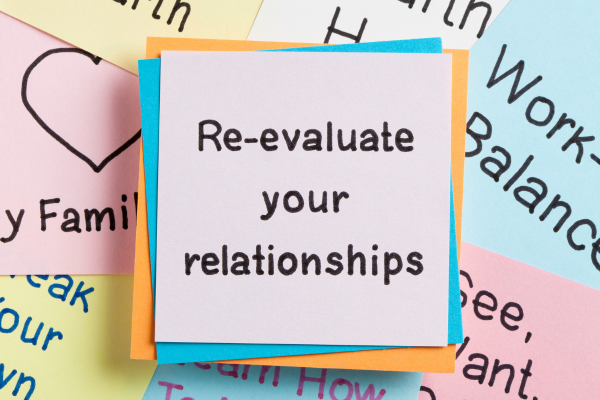
Reflecting on the Past Year: Setting the Stage for a Bright Future
As December unfolds and the year draws to a close, it’s a perfect time to embark on the soul-nourishing journey of self-reflection. A year has passed, leaving a trail of experiences, lessons, and memories. It’s an opportune moment to review your goals, assess your progress, and set the stage for a brighter future. In this blog post, we will delve into the art of reviewing your goals with a sense of encouragement and to help you make the most of this introspective process.

Setting Goals for the Year Ahead
Setting goals at the beginning of the year is a powerful practice. It provides you with a roadmap, a sense of purpose, and a clear vision for what you want to achieve. However, goals are not set in stone; they are dynamic and should evolve with you as you grow and change. Hence, the importance of reviewing them cannot be overstated.
Step 1: Create a Peaceful Environment
Setting the stage for reflection is crucial before diving into the nitty-gritty of goal review. Find a quiet, cozy corner where you can be alone with your thoughts. Light a scented candle, play soothing music, or simply sit in comfortable silence. This peaceful environment will help you connect with your inner self.
Step 2: Revisit Your Goals
Begin by revisiting the goals you set at the beginning of the year. Take your time to read through them carefully. Remember, it’s perfectly normal for some goals to have evolved or even changed entirely. Life is unpredictable, and our aspirations can shift with our experiences.
Step 3: Celebrate Your Achievements
Celebrate your wins and achievements, no matter how small they may seem. Reflect on the progress you’ve made, the obstacles you’ve overcome, and the skills you’ve developed along the way. Recognizing your accomplishments will boost your self-esteem and motivation.
Step 4: Assess Your Progress
Next, assess your progress toward each goal. Are you closer to achieving them than you were at the start of the year? If so, what actions or habits contributed to your success? Conversely, if you haven’t made as much progress as you hoped, what obstacles or distractions hindered your path?
Step 5: Align with Your Values
Evaluate whether your goals still align with your values and aspirations. Your values may evolve as you grow, leading to a shift in priorities. Be open to the possibility that some goals may no longer serve your authentic self. Embrace change as a natural part of your personal growth journey.
Step 6: Set New Intentions
Once you’ve reviewed your goals and assessed your progress, it’s time to set new intentions for the year ahead. Be mindful of your aspirations, values, and lessons learned throughout the year. What do you want to achieve, experience, or create in the coming year? Set SMART (Specific, Measurable, Achievable, Relevant, Time-bound) goals that resonate with your authentic self.
Step 7: Craft an Action Plan
To turn your intentions into reality, craft a practical action plan. Break down your goals into smaller, actionable steps. Create a timeline and hold yourself accountable. Remember that consistency and perseverance are key to achieving your dreams. What virtues will help you meet your goals
Step 8: Embrace Self-Compassion
Throughout this process, remember to be kind to yourself. Self-compassion is a powerful tool that helps you navigate the ups and downs of life with grace. Embrace the imperfections and setbacks as opportunities for growth and learning.
Reflecting on your goals at the end of the year is a beautiful and transformative practice. It allows you to celebrate your achievements, realign with your values, and set intentions for a brighter future. Embrace change as a natural part of your growth journey, and approach the coming year with enthusiasm and determination.
As you embark on this journey of self-reflection, may you find clarity, inspiration, and the courage to pursue your dreams with unwavering dedication. Remember, the power to shape your future lies within you, waiting to be harnessed. Embrace it with open arms, and may the year ahead be filled with purpose, joy, and fulfillment.

A Compassionate Self-Assessment for the Year’s End
This blog post will explore the significance of assessing your physical, emotional, and mental well-being and how you can gently and compassionately embark on this self-assessment journey. Read here.

Year-End Guide to Evaluating Your Relationships
In this blog post, we will delve into the art of evaluating your relationships with a heart full of encouragement and guidance, helping you make informed decisions on nurturing and cherishing these precious bonds. Read here.

Coming This Month
Embrace the Power of Vision
In this blog post, we will delve into the art of reviewing your goals with a sense of encouragement to help you make the most of this introspective process.
I invite you to sign up for our newsletter. It is a great way to get the Virtue of the Month and tips on relationships, parenting, and self-care. In addition, you’ll be the first to know about upcoming classes for successful families.
To sign up, visit the “Newsletter” section here on the website. Enter your email address, and you’ll receive our newsletter in your inbox on Wednesdays. I appreciate your interest in bringing out the best in your children and yourself. We look forward to keeping you informed through our newsletter!







